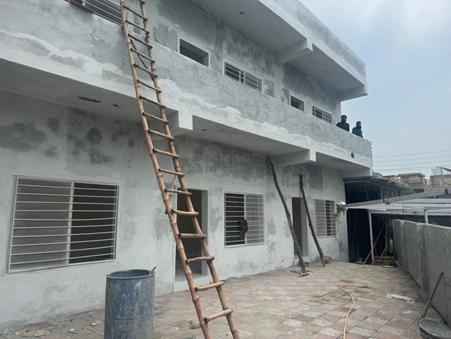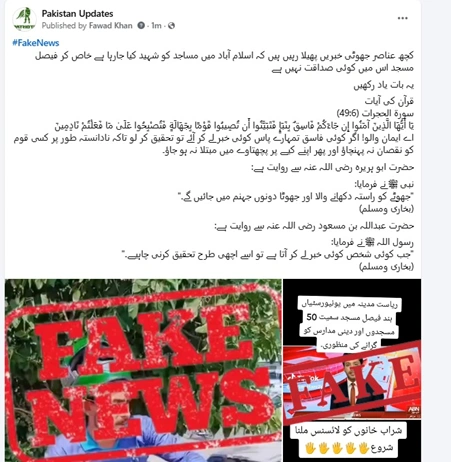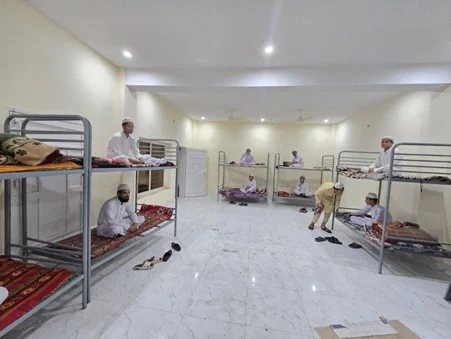The recent relocation of Madni Masjid and its adjoining madrasah from Murree Road, Islamabad, has been a subject of unwarranted controversy, largely fuelled by misinformation and selective narratives. A careful review of facts, religious injunctions, and legal frameworks reveals that the demolition and subsequent reconstruction were executed strictly in accordance with the law, Islamic principles, and with the full consent of the mosque administration. Far from constituting an act of irreverence, the move embodies the very spirit of justice, public interest, and procedural integrity enshrined in both the Qur’an and the Sunnah.
The original Madni Masjid structure stood on encroached land, a fact verified by municipal surveys and acknowledged by its own administrators. Occupying land without rightful ownership is a violation not only of state law but also of Shariah principles. Islam upholds the sanctity of property rights with great emphasis, and the Qur’an in Surah Al-Baqarah (2:114) condemns the unjust occupation of places of worship or hindrance to legitimate religious practice. The relocation process, therefore, was not an act of hostility towards the mosque but a necessary correction to an untenable and unlawful situation.
The authorities acted with commendable foresight and fairness. A formal two-month notice was issued to the administration, allowing ample time for consultation, planning, and transition. During this period, a brand-new mosque and madrasah were constructed in Margalla Town, not as a token replacement, but as a fully functional and purpose-built facility. This approach ensured that the spiritual and educational needs of the community continued uninterrupted. All students were safely relocated before the demolition, and at no point was the sanctity of worship compromised. The removal of the old structure took place only after the alternative facility was ready for use, eliminating any possibility of hardship to worshippers.

Islamic jurisprudence provides ample precedent for such relocation when dictated by public welfare and justice. The example of Masjid Dirar, as narrated in Sahih Bukhari, is instructive: the Prophet Muhammad ﷺ ordered its removal when it became a source of harm and division, despite its outward identity as a place of worship. This underscores the principle that a mosque’s legitimacy is not derived solely from its physical presence, but from its lawful establishment and alignment with the higher objectives of Shariah (Maqasid al-Shariah).
The legal maxim, “There should be neither harming nor reciprocating harm” (Ibn Majah),
further supports the principle that any structure, even a mosque, situated on unlawfully occupied land may be lawfully relocated if it serves the greater good.

Yet, despite the clarity of these principles, certain groups have sought to distort the facts. Among them, students affiliated with Lal Masjid have been particularly vocal, attempting to incite public outrage without due verification of circumstances.
This approach is deeply at odds with the Qur’anic command in Surah Al-Hujurat (49:6), which instructs believers to confirm information before acting upon it, lest they commit injustice through ignorance.
In bypassing this essential duty of verification, these agitators risk undermining communal harmony and bringing disrepute to genuine causes of justice.
The propagation of half-truths and emotive rhetoric is a disservice to both faith and society. It manipulates public sentiment, exploiting religious symbols to provoke discord, while ignoring the careful measures taken to preserve religious function and dignity. The new Madni Masjid in Margalla Town is not only operational but also built in a more accessible and legally sanctioned location, free from disputes over ownership. Worshippers and students alike now enjoy a facility that meets their needs without infringing upon the rights of others. This is an outcome that should be celebrated, not maligned.
From a governance perspective, the handling of this matter reflects a model for conflict resolution in cases of illegal encroachment involving religious sites. It demonstrates that the rule of law and respect for faith need not be in opposition. By engaging stakeholders, providing alternatives before removal, and grounding decisions in both civil and religious law, authorities can ensure outcomes that uphold justice while safeguarding the community’s spiritual life.
It is also necessary to recognise the danger of allowing misinformation to dictate public discourse. In an era where rumours can travel faster than facts, the responsibility to uphold truth becomes even more urgent. Religious leaders, journalists, and community influencers bear a heightened duty to resist sensationalism and adhere to verified information. When they fail to do so, they not only erode public trust but also risk inflaming tensions that could otherwise be resolved peacefully.

In the case of Madni Masjid, the legal, religious, and moral justification for relocation is unassailable. The process adhered to due notice, secured the cooperation of mosque administrators, and provided an equal or better facility in advance. To frame this as an act of persecution is to invert reality and diminish the genuine instances where religious freedoms are at risk. Such distortion dilutes the seriousness with which society ought to address real violations of worship rights, and it undermines the credibility of those who habitually cry foul without cause.
The relocation of Madni Masjid stands as a testament to the compatibility of Islamic principles with responsible governance. It reaffirms that justice in Islam is not an abstract ideal but a lived reality, demanding adherence to law, respect for rightful ownership, and commitment to the welfare of the community. Those who seek to weaponize religion for political agitation would do well to reflect upon the Qur’anic injunctions they claim to uphold.
The public, meanwhile, should take heart that their institutions, both religious and civic, can work together to resolve disputes without sacrificing principle or piety. The new mosque in Margalla Town is not merely a replacement; it is a reaffirmation of faith, built on the solid ground of legality, consent, and consideration for the greater good. The narrative of persecution is unfounded, the propaganda hollow. Truth, as always, stands clear from falsehood, for those willing to see it.
Disclaimer: The views and opinions expressed in this article are exclusively those of the author and do not reflect the official stance, policies, or perspectives of the Platform.








